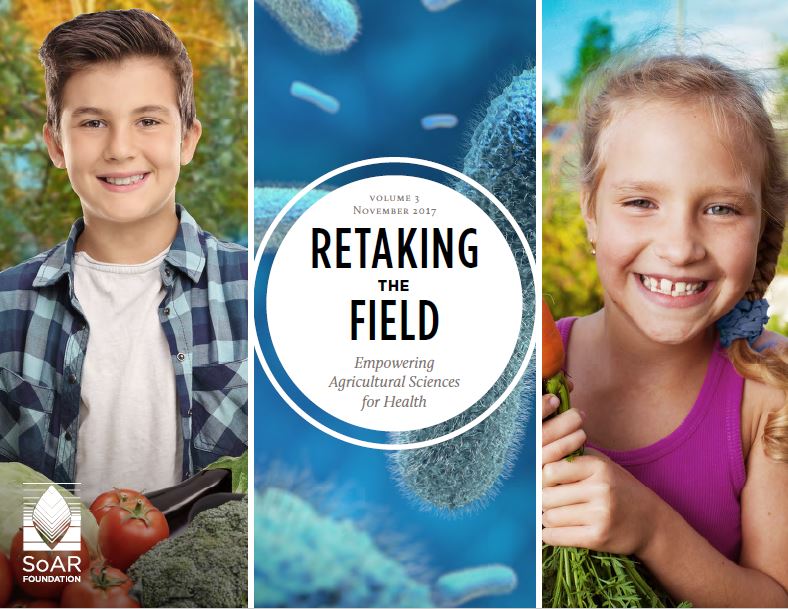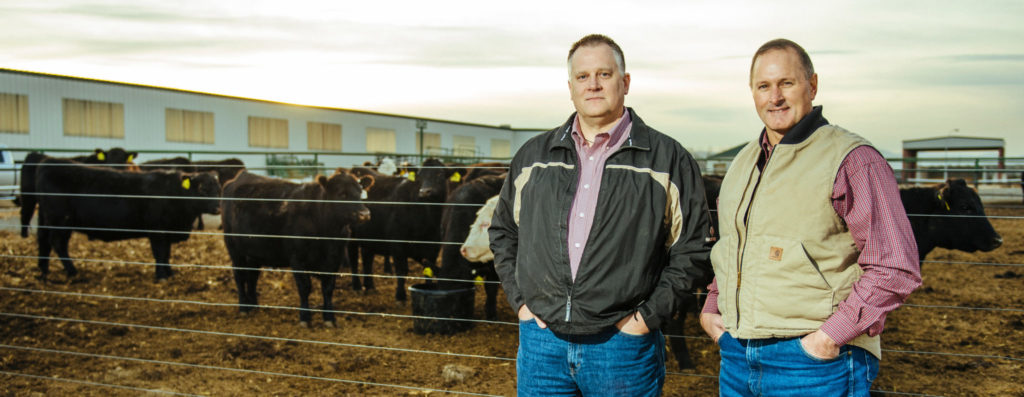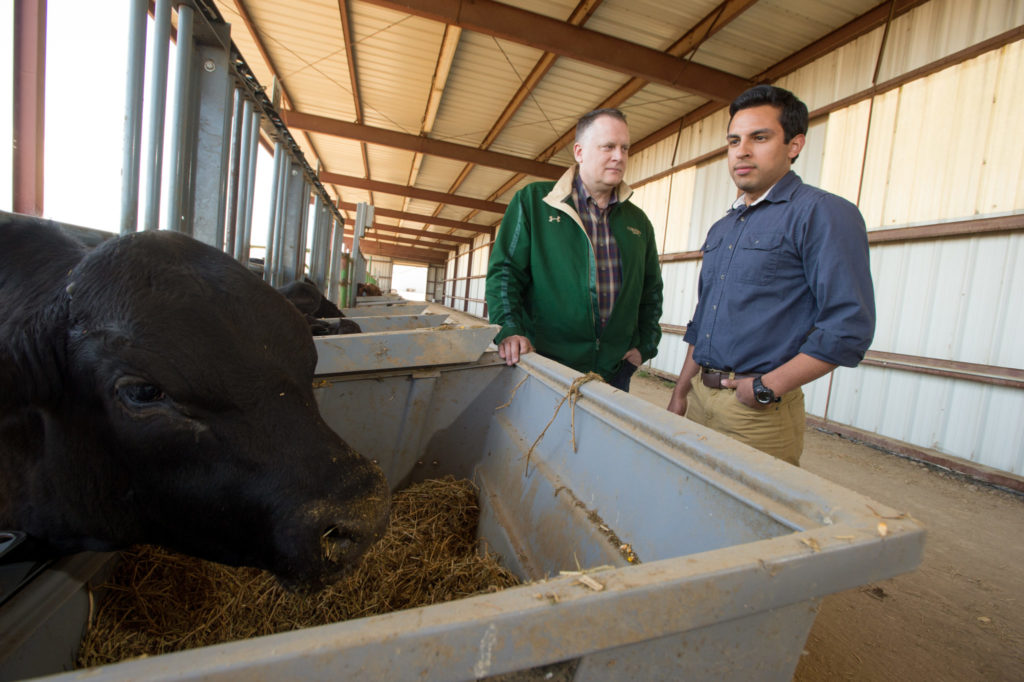
Colorado State University joins 10 prominent research institutions in the United States, and the Supporters of Agricultural Research (SoAR) Foundation in urging increased federal support of food and agricultural science. The new report, Retaking the Field—Empowering Agricultural Sciences for Health, explores the success of research projects funded by the Agriculture and Food Research Initiative, the flagship competitive grants program of the USDA’s National Institute of Food and Agriculture.
Dr. Paul Morley, CSU professor of epidemiology and infection control, contributed “Sequencing Solutions: Revolutionizing Understanding of Antimicrobial Resistance with Genome Analysis” to the report. His article examines state-of-the-art “metagenomic” sequencing techniques that can help us understand the bigger picture of antimicrobial resistance in entire microbial communities.
“In the past, researchers have investigated antimicrobial resistance by looking at one or two species of bacteria, even though our microbiome (and that of animals) consists of billions and billions of bacteria from thousands of different species,” said Morley, who is working on next-generation sequencing technology to develop innovative tools, advance safe production methods, and create a paradigm shift for the life sciences.
“You can’t tell the health of a forest by only looking at a single blade of grass. Rather, the health of a forest is determined by investigating the mixture of plant species,” he said. “You need to examine all members of the ecosystem to investigate ecosystem health, which in this case is manifested by resistance to antimicrobial drugs. Our investment in developing state-of-the-art genomic sequencing to allow investigation of the entire microbiome has revolutionized our ability to characterize antimicrobial resistance from the perspective of entire ecosystems.”

Colorado State researchers on the project include Dr. Keith Belk, Dr. Zaid Abdo, Dr. Milt Thomas, Dr. David Van Metre, Dr. Dale Woerner, and Dr. Noelle Noyes. By increasing the understanding of genetic analysis techniques, the team is training the next generation of agricultural scientists.
“People in agriculture are committed to promoting public health. I have had outstanding teachers and mentors during my training. I now have the great reward to train promising and dedicated young scientists,” said Morley.
The new report looks at how scientists have tackled three separate crises that have immense economic impact for the United States and the world:
- Nutrition-related diseases cost Americans billions of dollars in medical expenditures each year. Estimated costs for high cholesterol are $34.5 billion; obesity, $147 billion; diabetes, $176 billion; heart disease, $193.4 billion;
- Zoonotic diseases—those that plague both animals and humans—resulted globally in $20 billion in direct economic losses and more than $200 billion in indirect losses from 2000 to 2010; and
- Foodborne illness costs Americans $15.6 billion annually according to USDA estimates.
“Scientists have made tremendous strides in keeping our food safe and nutritious,” said Thomas Grumbly, SoAR’s president. “But the federal investment in food science has remained flat as the number of threats to our food system continues to climb. The 2018 Farm Bill will set agricultural funding priorities for the next five years. We all need research to be at the top of this agenda.”
The report—the third in SoAR’s series—shows how scientists are solving some of these problems in public health despite the USDA’s limited research budget. Since 2009, USDA has received less than 4 percent of the federal research budget, down from almost 40 percent in 1940.
The Agriculture and Food Research Initiative presents a strong case for how this lack of funding leaves so much important science “on the cutting-room floor.” Proposals are subject to peer review to make sure that the questions in agriculture and food science can be answered.

Since the program’s inception 10 years ago, only one quarter of all of the grants rated as high-value science have been funded, due to lack of resources. Currently, the program’s annual budget is $375 million, slightly more than half the level authorized in the past two Farm Bills—$700 million.
“Federal agriculture policy is at a place where program budgets are ‘authorized’ in the Farm Bill at levels that are never reached when the federal budgets are negotiated,” Grumbly said. “There are truly urgent needs to produce more food, fiber and fuel while consuming fewer resources and protecting public health in the face of existing and emerging threats.”
Along with Morley, featured researchers and their teams working to discover solutions include:
- Robert Hutkins, Ph.D., University of Nebraska-Lincoln—How to enable beneficial bacteria to thrive in the gut and reduce inflammation.
- Bradley P. Marks, Ph.D., P.E., Michigan State University—How to reduce the risk of Salmonella contamination in ready-to-eat food products.
- Lisa Mauer, Ph.D., Purdue University—How to both optimize delivery and stabilize thiamin in food products.
- Melha Mellata, Ph.D., Iowa State University—How to control coli infections to protect both chickens and humans.
- Carmen I. Moraru, Ph.D., Cornell University—How to develop nanoengineered non-stick surfaces to block bacterial contamination during food processing.
- Nitin Nitin, Ph.D., University of California, Davis—How to develop innovative approaches to prevent bacterial contamination of fresh fruits and vegetables.
- Federico Rey, Ph.D., University of Wisconsin-Madison—How different gut microbes affect the ways that flavonoids are metabolized to improve heart health.
- Gary Perdew, Ph.D., Pennsylvania State University—How broccoli interacts with the gastrointestinal lining to improve the gut biome and digestive health.
- Shengmin Sang, Ph.D., North Carolina A&T State University—How to develop flavonoid-enriched foods to prevent and treat diabetes.
- Morgan Scott, DVM, Ph.D., Texas A&M University—How to develop and implement effective interventions and best practices for antibiotic stewardship in beef and dairy production.
About the Supporters of Agricultural Research (SoAR) Foundation
The SoAR Foundation leads a non-partisan coalition representing more than 6 million farming families, 100,000 scientists, hundreds of colleges and universities as well as consumers, veterinarians, and others. SoAR educates stakeholders about the importance of food and agricultural research to feed America and the world and advocates for full funding of USDA’s Agriculture Food and Research Initiative (AFRI). SoAR supports increased federal investments to encourage top scientists to create agricultural solutions that improve public health, strengthen national security, and enhance U.S. economic competitiveness.